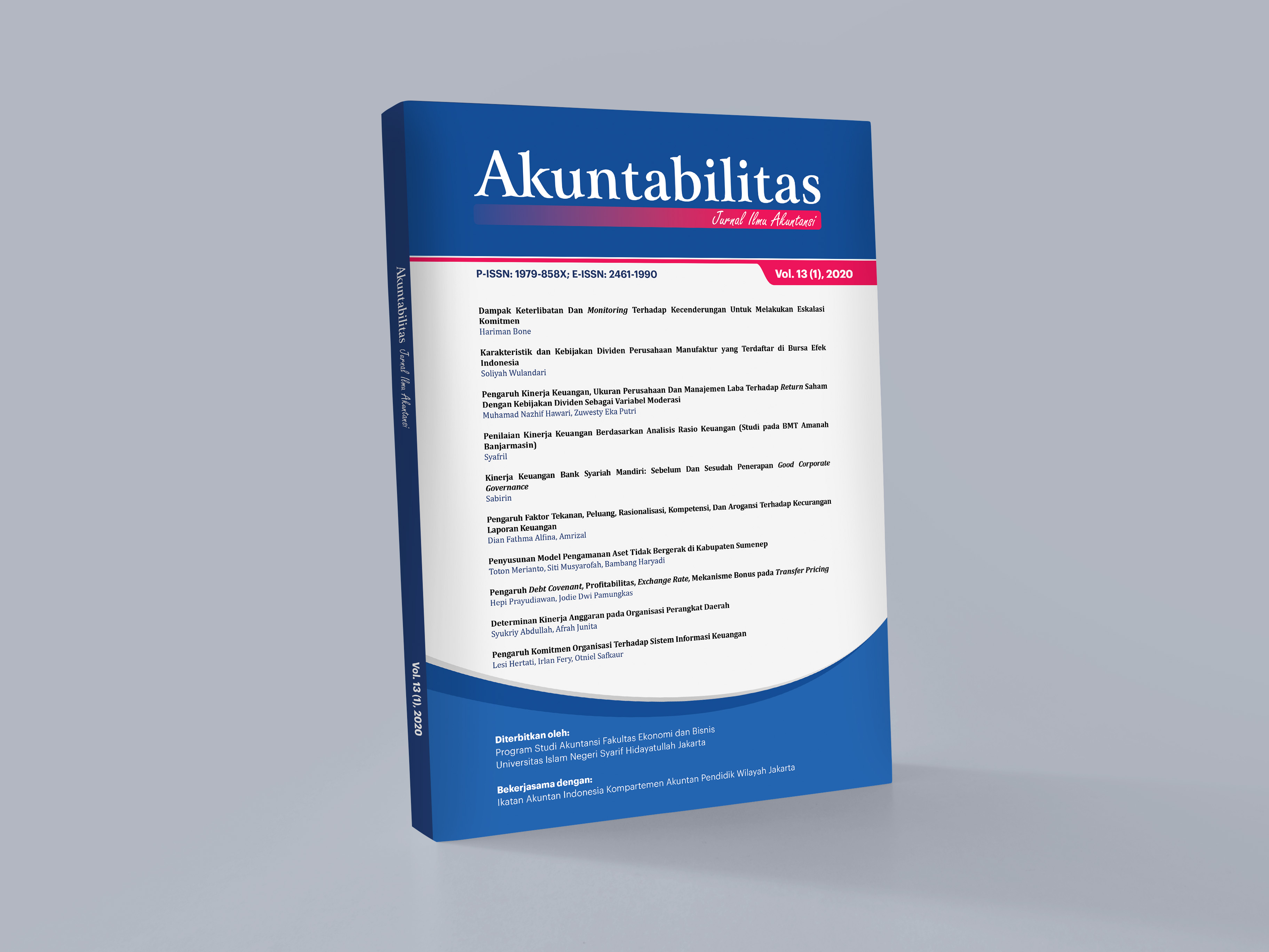Pengaruh Faktor Tekanan, Peluang, Rasionalisasi, Kompetensi, dan Arogansi Terhadap Kecurangan Laporan Keuangan
DOI:
https://doi.org/10.15408/akt.v13i1.14497Keywords:
fraud pentagon, financial statement fraud, banking financial statement fraudAbstract
This study was to examine the influences of the fraud pentagon theory’s factors towards the financial statement fraud on banking listed in BEI for the period of 2014-2018. This study consisted of nine independent variables. Four variables of pressure (financial stability, external pressure, financial targets, personal financial needs). Two variables of the opportunity (nature of industry, ineffectiveness of monitoring). And a variable of rationalization, competence, and arrogance. Based on the results of Beneish M-Model analysis, out of 43 banks, 28 of them were indicated to have manipulated their financial statements during the study period. Meanwhile, the results of logistic regression analysis showed a positive influence of financial stability (ACHANGE), personal financial needs (OSHIP), nature of the industry (RECEIVABLE), ineffective monitoring (IND), competence (DIRCHANGE), and arrogance (CEOPIC) on financial statement fraud, while external pressures (LEV), financial targets (ROA), and rationalization (AUDCHANGE) have a negative effect on financial statement fraud
References
ACFE. (2012). Report To the Nations on Occupational Fraud and Abuse: 2016 Global Fraud Study. Association of Certified Fraud Examiners, 1–74.
ACFE. (2012). Report To the Nations on Occupational Fraud and Abuse: 2016 Global Fraud Study. Association of Certified Fraud Examiners, 1–79.
ACFE. (2016). Report To the Nations on Occupational Fraud and Abuse: 2016 Global Fraud Study. Association of Certified Fraud Examiners, 1–92.
ACFE. (2018). Report to the Nations 2018 Global Study on Occupational Fraud and Abuse. ACFE Report, 10, 80.
Agusputri, H., & Sofie, S. (2019). Faktor - Faktor Yang Berpengaruh Terhadap Fraudulent Financial reporting Dengan Menggunakan Analisis Fraud Pentagon. Jurnal Informasi, Perpajakan, Akuntansi, Dan Keuangan Publik, 14(2), 105.
https://doi.org/10.25105/jipak.v14i2.5049
AICPA. (2002). AU Section 316 Consideration of Fraud in a Financial. October
Arief, T.. (2019, April 23). Terjadi 4 Internal Fraud di BJB Syariah Selama 2018. Finansial Bisnis. Diakses dari https://finansial.bisnis.com/read/20190423/90/914480/terjadi-4-internal-fraud-di-bjb-syariah-selama-2018
Arisandi, D., & Verawaty. (2017). Fraud Pentagon dalam Mendeteksi Kecurangan Laporan Keuangan pad Perusahaan Keuangan dan Perbankan di Indonesia. Seminar Nasional Global Competitive Advantage.
Bawekes, H. F., Simanjuntak, A. M. A., & Daat, S. C. (2018). Pengujian Teori Fraud Pentagon Terhadap Fraudulent Financial reporting (Studi Empiris pada Perusahaan yang Terdaftar di Bursa Efek Indonesia Tahun 2011-2015). Jurnal Akuntansi & Keuangan Daerah, 13(1), 114–134.
Fuadin, A. (2017). Analisis Fraud Diamond dan Ukuran Perusahaan Dalam Mendeteksi Kecurangan Laporan Keuangan (Financial Statement Fraud).
Jalaludin, R. (2017). Terhadap Kecurangan Laporan Keuangan Pada Perusahaan Lq-45. 45.
Journal, D., & Accounting, O. F. (2013). PENDETEKSIAN KECURANGAN LAPORAN KEUANGAN MELALUI FAKTOR RISIKO TEKANAN DAN PELUANG (Studi Kasus pada Perusahaan yang Mendapat Sanksi dari Bapepam Periode 2002-2006). 2, 700–711.
Manurung, D. T., & Hadian, N. (2013). Detection Fraud of Financial Statement with Fraud Triangle. Proceedings of 23rd International Business Research Conference.
Nugraheni, N. K., & Triatmoko, H. (2018). ANALISIS FAKTOR-FAKTOR YANG MEMPENGARUHI TERJADINYA FINANCIAL STATEMENT FRAUD: PERSPEKTIF DIAMOND FRAUD THEORY (Studi Pada Perusahaan Perbankan Yang Terdaftar Di Bursa Efek Indonesia Periode 2014-2016). JURNAL AKUNTANSI DAN AUDITING. https://doi.org/10.14710/jaa.v14i2.19774
Quraini, F., & Rimawati, Y. (2018). Determinan Fraudulent Financial reporting Using Fraud. Journal of Auditing, Finance, and Forensic Accounting (Jaffa), 6(2), 105–114.
Saputra Rizki M. A, & Kusumaningrum N. D. (2017). Analisis Faktor – Faktor Yang Mempengaruhi Fraudulent Financial reporting Dengan Perspektif Fraud Pentagon Pada Perusahaan Perbankan Yang Terdaftar Di Bursa Efek Indonesia Tahun 2011-2015. Jurnal Akuntansi Dan Keuangan, 22(2), 121–134. Retrieved from http://repository.lppm.unila.ac.id/5046/1/JAK VOL 22 JULI 2017 - Dewi Sukmasari.pdf
Siddiq, R., & Achyani, F. (2017). Fraud Pentagon Dalam Mendeteksi Financial Statement. Seminar Nasional Dan The 4th Call for Syariah Paper.
Skousen, C. J., & Twedt, B. J. (2009). Fraud score analysis in emerging markets. Cross Cultural Management: An International Journal. https://doi.org/10.1108/13527600910977373
Tessa G., C. (2016). Fraudulent Financial reporting : Pengujian Teori Fraud Pentagon Pada Jenis Sesi Paper : Full paper. Simposium Nasional Akuntansi.
Tiffani, L., & Marfuah, M. (2015). Deteksi financial statement fraud dengan analisis fraud triangle pada perusahaan manufaktur yang terdaftar di bursa efek Indonesia. Jurnal Akuntansi & Auditing Indonesia. https://doi.org/10.20885/jaai.vol19.iss2.art3
Ulfah, M., Nuraina, E., & Wijaya, A. L. (2017). Pengaruh Fraud Pentagon dalam Mendeteksi Fraudulent Financial reporting (Studi Empiris pada Perbankan di Indonesia yang Terdaftar di BEI). The 9th Forum Ilmiah Pendidikan Akuntansi (FIPA), 5(1), 399–417.
Yulia. (2018). Pengaruh Elemen Fraud Diamond Theory Dalam Mendeteksi Financial Statement Fraud. Naskah Publikasi Universitas Negeri Padang, 1–16.

